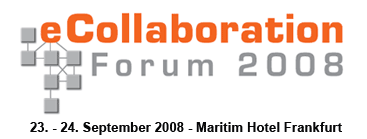Some notes on the talks at the Enterprise 2.0 Forum. Kongressmedia put together a nice agenda and group of speakers. Check out some of the tagged and tracked tweets at Twemes. I and some others were microblogging too.
Suw Charman-Anderson started off the event, I can’t give a full report of her extensive talk, so just some tidbits. She offered sound advice (I am agreeing on all accounts, this is boring I know, but hey, I guess we’re just having “shared understanding”). And I really understand and value her effort to make things understandable, but not too easy at the same time.
- provide the pilot group with gripping stories, let them become evangelists (“each user can become a trainer”, yes, we’ve reached a lot if we’re at this point )
- on success factors for adoption: all in all it’s preferrable to focus on user-centric adoption (yes, evangelists, catalysts, whatever we call these pivotal people)
- on the importance of leadership in E.0 projects (I guess that’s herding cats) – yes, leading by example is important (yes, I too talked in my workshop yesterday about the importance of having both method- and power-sponsorship)
- Enterprise 2.0 change management needs to be in for the long haul, this is a long term engagement thing
- nice metaphors too – “trojan (wiki) mouses” that sneak into corporations
Next up were Oliver Nitz and Rupert Petschina of Web Innovation Institute and Telekom Austria AG. They were presenting on the potentials of social software for making internal processes more effective. There was a nice metaphor and “storytelling hook” inside their presentation, i.e. the picture of a hen shed that reminded me too that I really need to blog about Lee Bryant’s “Free the Battery Humans” presentation at this year’s reboot and some thoughts I evolved since then.
Next up was JP Rangaswamy, again no full account of the talk, but some points. Suw did an extensive post (“Enterprise 2.0 Forum: JP Rangaswami“) on JP’s talk, extensive coverage and recommended. I guess typing on a whitey Mac goes a lot faster than on my dull PC box.
- cost of repair and cost of damage as equation to look at while implementing wikis
- nice story on Space Shuttle design limits that derive from long-ago decisions, i.e. designing the width of rail gauges
- we’re in the middle of big shifts, like e.g. distributed ability and power to publish, Internet as a nice copy machine
- my price for best quote goes to JP calling to “throw the policies away” (if they are restricting you to adapt to the changed contexts).” Yes, there’s no point in following out-dated modes, when we’re in disrupted mode
- one central guiding principle for corporate wiki implementation: keep the cost of transmission and reproduction low
On organizational pathologies, JP showed a spy manual on how to interfere and disturb – and even when the audience was giggling we all know that these are timeless issues in corporations. What once was sabotage is now normal mode of work.
Then, it’s Alexander Warta from Bosch, talking about opportunities for corporate wikis and experiences at Bosch:
- it’s not about nifty tools, rather it’s about a new paradigm (knowledge works needs to be self-driven and distributed)
- What they did? Many things like e.g. supporting expert debriefings, international expert’s collaboration and much more
- presented the results of an inter-company study on wiki use (done by the Bosch team).
Perceived Challenges? He’s systematizing it into seven fields of tension:
- individual effort <-> social, collective benefit
- awareness <-> privacy
- current information <-> trustable, sound information
- structure <-> freedom (and freeform emergence of structure)
- usability <-> functionalities
- participation <-> coherence
- media boundaries <-> media integration (binding it all together)
BTW, I have asked Alexander to present these results and some of his experiences at the upcoming WikiWednesday Stuttgart. Come and join us if you’re close.
Next up, and last talk before lunch is by Matthias Büger of Deutsche Bank (I blogged about the pre-conference interview here: “Pre-Conference interview: dbWiki – building a Web 2.0 corporate knowledge base“) but he asked the audience not to tweet/blog/whatever his actual talk. OK, no problem. Now off to lunch and “networking d’enfer”




